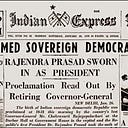I am against affirmative action, in its current guise. Not that its presence in the US impacts me personally (because I don’t live in the US), but its principle and various avatars do. I wanted to share a perspective from another country.
I grew up in a country where ‘reservation’ (the Indian word for affirmative action) was among the first things to be written into our Constitution — hence it is law. Not just for admissions into educational institutions but also for government jobs. The Supreme Court, sensibly, recently struck down a move by a state government to introduce reservations in job promotions too.
Reservations have reached epidemic proportions — almost all states have 50% of the total seats reserved based on caste alone. Including the reservations for physically handicapped, victims of terror attacks, veterans and a few other categories the nation wide highest reservation is in Harayana (69%) — a state with India’s lowest sex-ratio, rampant gun-owning and crimes. Harayana is followed by possibly India’s most progressive and industrialised state (where many socio-economic indicators are at par with Western Europe), Tamil Nadu — which makes for a fascinating study in contrast.
However, what gives me most hope is that it is written into law — hence it can be challenged by petitions, political parties and ultimately the people who can vote such parties into power; and can possibly be struck down. Given that it is law, I like the transparency it affords educational institutions and its student body. Rather than arbitrary quotas — there are real quotas. Another heartening fact is that in a country as diverse as India — there are no religious quotas anywhere and neither are you required to self-identify (although names can be quite a giveaway!).
Reservations were intended to be for one generation alone — but given they are vote catchers, they have only widened since India’s independence. My own view of the system is that second and third generation users of this reservation should be ashamed of themselves. The government’s job is not to right historical wrongs but to move forward — in the most fair way possible. Almost no one I know begrudges reservation being written into the Constitution in the first place — but almost everyone I know begrudges its continued presence after two generations have had a chance to benefit from it; reservation was supposed to end after 15 years. The Grand Victimhood Treadmill.
Personally, I fall in the ‘general category’ and have no reservations helping me. I have had to compete the hardest and attain the highest possible marks to have a shot of getting into the top institutions or the civil services. I was fortunate enough that my grades were enough to land me in one of the good schools in India — but the cycle to get ahead only intensifies further after graduation. Admissions into Harvard, Stanford, LBS, INSEAD etc. for graduate work intensify manifold because almost all deserving candidates from India tend to be G.E.Ms — General Engineering Male; the category with the lowest admission rates in the school’s eternal quest to have a ‘representative student body’! So the Indian kid with the Indian passport in your graduate class — he or she has really worked hard to be there! Haha!
